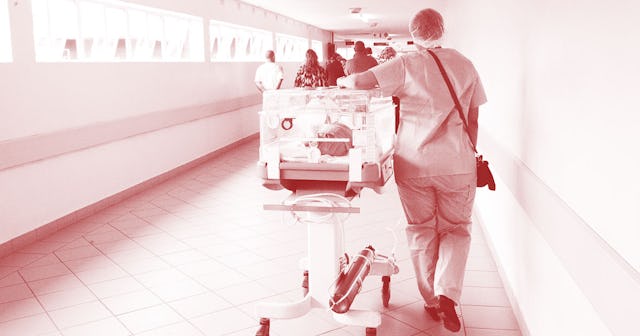Technology Is Seeking To Improve Childbirth And Postpartum Maternal Health

During the first few weeks postpartum after a traumatic birth experience, there was one thing that I wanted more than anything. And surprisingly, that thing wasn’t sleep — although sleep was a close second.
That thing I wanted — and needed — most was to be listened to. I needed medical attention that could be scheduled quickly to meet the urgency of my needs. I quickly found out that having retained placenta could leave you in a lot of pain. But unfortunately, I had neither considerate care nor expedited medical assistance.
There was no shortage of factors working against me. My body was hurting, but I didn’t have the words to explain what was wrong. I was one of the millions of Americans who have limited options of medical professionals due to living in rural America. And I am a Black woman.
Each of those factors worked against me to create a unique cocktail of physical discomfort and medical risks. It shouldn’t take anyone nearly a month to identify postpartum issues.
I wish I would’ve had a resource that gave me access to a medical professional who trusted my knowledge of my own body. Or someone to contact when things felt downright off.
My story isn’t as unique as one would hope. The maternal mortality crisis in the United States is finally being taken seriously in health conversations – particularly as it disproportionately impacts Black women. The infant mortality crisis has similar disparities across racial lines.
Thankfully, progress is being made to give new parents the resource that I never had. A web-based app called Mahmee is making continuous postpartum care much more accessible.
Jair Lázaro/Unsplash
The resource was founded in 2014 and created by a mother-daughter team, Melissa Hanna, CEO of Mahmee and co-founder, along with her mother, Linda Hanna who is both a nurse and a lactation consultant.
Mahmee describes itself as the following: “a comprehensive maternity and infant care management platform. We partner with payers and providers to create care programs that make it easy for all families to receive comprehensive prenatal and postpartum care. New and expecting parents can also join the Mahmee community directly to start receiving support.”
Mahmee aims to prevent moms and babies from “falling through the cracks” of our often ineffective healthcare system. They aim to improve continuity of care and make it easier for folks to catch health issues at the earliest stage possible. And they do that by bridging the gap between more traditional medical providers, like OBGBYNs, and those who are typically more independent health professionals, like lactation consultants.
Although Mahmee isn’t going to replace one’s current medical staff, they are there to act as a medical liaison and provide education and support between visits. It’s useful in prenatal, pregnancy, and postpartum stages.
Both free and paid options are available and the platform lists “educational curriculum, direct messaging with coaches, video-chat support groups, webinars, and 1-on-1 virtual consults” as options to receive personalized care through Mahmee. All of this is available through a HIPAA secure database.
Vidal Balielo Jr./Pexels
Physicians and other healthcare providers can also reap the benefits of Mahmee by enrolling in their network.
There are also surveys that allow new parents to assess mental, emotional, and physical health — something I could have used when I experienced mild PPD in the early postpartum stages.
Mahmee has the potential to be a game-changer in the healthcare world. There are currently more than 1,000 providers and organizations within the network and the experts featured include maternity coaches, lactation consultants, and OB/GYNs.
Mahmee has gotten a lot of attention lately, especially since they received support and financial backing from Serena Williams, who experienced a pulmonary embolism shortly after the delivery of her daughter. Her story illustrates the ways that racial bias, not class or education, are uniquely responsible for Black women’s negative birth outcomes.
It’s too late to change the birth experiences that I and millions of other mothers have had. But it isn’t too late for us to share our stories and make sure that those who are about to embark on their reproductive journeys have the ability to start with full awareness of what is it risk.
The bottom line is this: Our birth and postpartum experiences run more smoothly when we have medical professionals who listen and treat us like competent beings. Mahmee is one of several new software options that has the potential to improve birth experiences and reproductive health through medical technology.
This article was originally published on